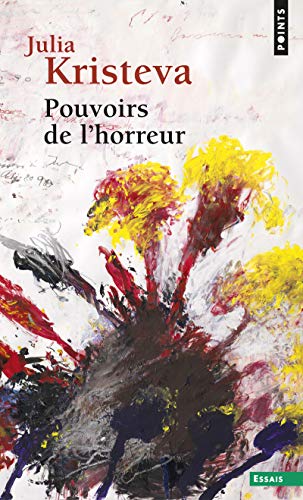
Although the text has become a classic in feminist criticism and queer theory, the term feminism is only mentioned one time and the term queer zero times. The work is an extensive treatise on the subject of abjection (mentioned 395 times), in which Kristeva draws on the theories of Sigmund Freud (mentioned 81 times) and Jacques Lacan (mentioned 10 times) to examine taboo (mentioned 60 times) and horror (mentioned 80 times). Essai sur l'abjection) is a book by Julia Kristeva. Powers of Horror: An Essay on Abjection (1980, Pouvoirs de l'horreur. " I think, however, Kristeva’s analysis in the long run transcends Douglas’s, which is arguably too intellectual, too narrowly confined to remarking category transgressions that violate a given culture’s conceptual-classificational paradigm and thereby provoke aversion responses to " impurity.”" - The Biology of Horror (2002) by Jack Morgan Unflaggingly, like an inescapable boomerang, a vortex of summons and repulsion places the one haunted by it literally beside himself."- Powers of Horror (1980) by Julia Kristeva But simultaneously, just the same, that impetus, that spasm, that leap is drawn toward an elsewhere as tempting as it is condemned. A certainty protects it from the shameful - a certainty of which it is proud holds on to it. Apprehensive, desire turns aside sickened, it rejects. It beseeches, worries, and fascinates desire, which, nevertheless, does not let itself be seduced. It lies there, quite close, but it cannot be assimilated. "There looms, within abjection, one of those violent, dark revolts of being, directed against a threat that seems to emanate from an exorbitant outside or inside, ejected beyond the scope of the possible, the tolerable, the thinkable. Robertson Smith, Arnold van Gennep, and Alfred Reginald Radcliff-Brown, or Rudolf Steiner, have noted that secular " filth," which has become sacred " defilement," is the excluded on the basis of which religious prohibition is made up."- Powers of Horror - An Essay on Abjection (1982) by Julia Kristeva


"Anthropologists, since Sir James George Frazer, W. Isolating them from the whole of his writings constitutes a defense or a claim on the part of the political left or right it is at any rate an ideological stance, not an analytic or literary position."- Powers of Horror - An Essay on Abjection (1982) by Julia Kristeva

"Doubtless contradictory, hotheaded, "raving" if you wish, Celine's pamphlets (" Mea Culpa", 1936, " Bagatelles pour un massacre", 1937, " L'Ecole des cadavres", 1938, " Les Beaux Draps", 1941), in spite of their stereotyped themes, carry on the wild beauty of his style.


 0 kommentar(er)
0 kommentar(er)
